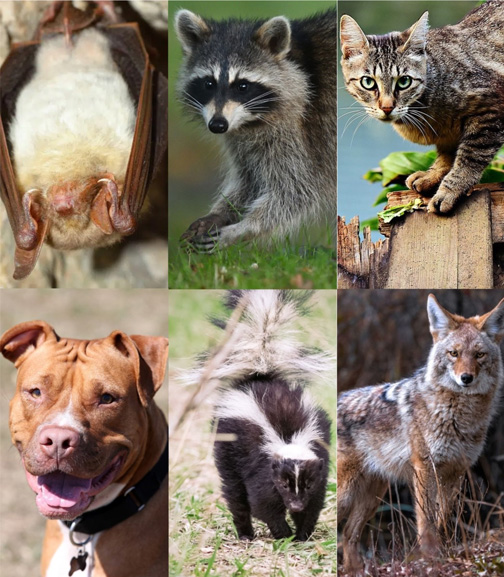Rabies Prevention Program
Epidemiology
- 407-858-1420
-
Fax
407-858-5517 -
Mailing Address
6101 Lake Ellenor Drive
Orlando, FL 32809
- To report an animal bite (Click Here) or call Orange County Animal Services at (407) 836-3111.
For Providers
- Florida Department of Health Rabies Guide 2014 (PDF 2 MB).
- Animal Bites & Rabies Report Form (PDF 76 KB).
- All incidents should be reported to Orange County Animal Services by calling 407-836-3111 and the Epidemiology Program at the Florida Department of Health in Orange County 407-858-1420.
- Advisory Committee on Immunization Practices (ACIP) post exposure recommendations.
- CDC Post-Exposure Prophylaxis (PEP).
Rabies is a fatal but preventable viral disease. It can spread to people and pets if they are bitten or scratched by a rabid animal. The rabies virus infects the central nervous system. If a person does not receive the appropriate medical care in a timely manner after a potential rabies exposure, the virus can cause disease in the brain, ultimately resulting in death. All mammals can get rabies, but only a few species are important as reservoirs for the disease. In the Florida, these include, but are not limited to the following high risk animals:
| High Risk Animals | |
|
|

Prevention
- Keep your pets Rabies vaccinations up to date.
- Spay and neuter your pets.
- Avoid contact with wild or stray animals.
- Never feed wild or stray animals.
- Never adopt wild animals or bring them into your home.
- Do not leave pet food outdoors.
- Always cover your trash cans.
- Don't let pets run free.
- Prevent bats from entering your home.
- If your animal is attacked do not touch them without wearing gloves.
- Wash your pet with soap and water to remove any saliva from the attacking animal.
- Keep your pet isolated from people and animals until the situation is assessed by Orange County Animal Services and the Florida Department of Health in Orange County.
Rabies Surveillance
- The Epidemiology Program, and Environmental Health Program, and Orange County Animal Services work together to prevent the spread of rabies in the domestic pet population and in humans. Per Florida laws, animal bites to humans are reportable and pet owners are required to have their pets vaccinated for rabies.
- Our office investigates all reported suspect animal bites and scratches and the animal is placed under quarantine for observation for 10 days following an exposure. The animal is observed at the end of the quarantine period to be sure that it is healthy.
- Although rabies in the pet population is not frequent, the disease is fatal and is present in the wild animal population. If you have a pet that has been attacked, you should immediately report it to the local health department and have the animal examined by a veterinarian.
- Persons reporting bites or other exposures to animals at risk for rabies should contact the Epidemiology Program.
- Persons who are bitten or scratched by animals or exposed to the saliva of animals through open wounds or mucous membranes (eyes, nose, and mouth) should seek immediate medical attention. All incidents should be reported to Orange County Animal Services by calling 407-836-3111 and the Orange County Health Department 407-858-1420.
- The program is also responsible for coordinating treatment for animal bite victims through the Health Department, Hospitals, and Local Providers.



Connect with DOH